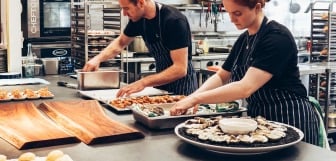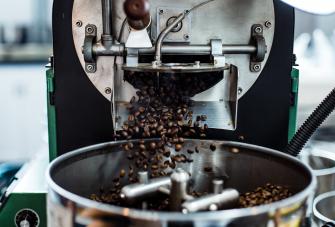9 Trends That Will Shape Hospitality in 2021
2020 has been a challenging year for businesses, full of unknowns and unprecedented obstacles. However, the venues that have innovated and embraced technology have managed to navigate the challenges and continue to keep their doors open.
Here are some of the trends that emerged in 2020, and which are set to continue into this year and beyond.
Hygiene and Social Distancing
Hospitality venues have always maintained a high standard of hygiene, but elevating your venue’s cleanliness even further is going to be crucial in 2021.
Venues need to be ensuring that tables are completely disinfected between patrons, and high contact areas such as door handles are regularly disinfected too.
Hand sanitiser is another addition that needs to be readily available for staff and customers. Any communal cutlery and condiment trays should be removed and tables set when patrons are seated. Venues also need to be informed of the contact tracing requirements for their area and make sure they are capturing the necessary information from dine-in guests.
Utilise outdoor dining
Regardless of the season, venues need to be utilising or expanding their outdoor dining areas. The pandemic has cemented this shift and it will likely remain the preference of both customers and cautious eatery owners wherever space and weather permits.
Maximising outdoor dining will help customers feel more comfortable spending time at your venue, and allow for an easier way to social distance.
Flexible offerings: takeout, delivery, and at-home meal kits
Stay at home orders were dished out worldwide, leading to a growth in demand for takeout and delivery options. Adapting to takeout, delivery, or at-home meal kit options allowed venues to continue to trade even after enforced shutdowns.
Unsurprisingly, food delivery soared in popularity in 2020. In the United States alone, one in three consumers uses a food delivery service weekly. Uber Eats, Grubhub, and Doordash lead the food delivery market, and there are countless other services competing for market share. But despite the popularity of remote ordering apps, many venues have chosen to keep their delivery operations in house, largely in an effort to avoid commission fees.
Platforms like Epos Now Order & Pay are helping venues to manage their own delivery and collection operations in-house at a fraction of the cost associated with partnering with a major app.
Touchless technology: Table Ordering and Digital menus
With ever-changing health guidelines, venues need to minimise touchpoints between operators and guests. This has been achieved thanks to the rise of mobile and online ordering apps that utilise QR codes, reducing the potential spread of germs on physical menus and ordering lines.
Plus, it’s been found that diners are likely to spend more when purchasing through a remote ordering system. For example, Taco Bell saw a 20 percent uplift in sales when an order was taken digitally.
Epos Now Order and Pay
With our new online ordering platform, Epos Now Order and Pay, venues can simply import their products and create a fully-branded and easily-accessible digital menu. Your digital menu can act as an extension of your restaurant’s website, allowing customers to easily order and pay directly from their phones.
The big advantage of this is that the restaurant owns the customer relationship, and isn’t reliant on expensive third-party apps.
Expended product ranges
With stay-at-home orders present in many places worldwide, venues had to create ways to allow customers to enjoy their favourite flavours at home. Many opted for adding product ranges like jams, chutneys, sauces or relishes that customers purchase and take home.
While the idea was initially a temporary measure, the success of these product ranges has seen many operators add them to their core line.
Additionally, releasing branded merchandise like tote bags, T-shirts, hoodies, or hats is an effective way to build your restaurant’s brand. We expect to see more venues leveraging merchandise in 2021.
Catering for dietary requirements
Vegetarian, gluten-free, and vegan diets continue to rise in popularity. Indeed, baristas have seen the overwhelming growth of dairy-free alternatives like oat or almond milk, and restaurants continue to see the popularity of plant-based meals.
Venues need to be prepared to have these alternatives on the menu if they want to remain in-step with the new consumer habits that looks set to remain in place in 2021 and beyond.
Low-ABV beverages
2021 is definitely set to see a change in how consumers purchase alcohol-related products. Research from Roy Morgan has pointed to a decline in alcohol consumption among Australians. As many as 28.9 per cent were found to be largely abstaining or avoiding alcohol, and 9.5 per cent had reduced their consumption.
The alcohol-free and low-ABV category is somewhat nascent in Australia, but it’s continued to grow thanks to increasing popularity of alcohol-free spirits and low-ABV beers. With this change, venues need to update their beverage menus to ensure they are accommodating the needs of these customers.
Supporting local producers
Awareness around the origin of ingredients - and support for local, sustainable produce - has been a growing trend in the hospitality industry for a number of years. A surge in the popularity of this trend demonstrates the growing focus on environmentalism, meaning that the relationship between chefs and producers is now more important than ever.
As well as being more environmentally aware, consumers everywhere are seeking out authentic experiences - and this often starts with dining out.
Reducing waste
Waste in the hospitality industry has been in the spotlight for a number of years now, particularly food, plastic, and paper waste. 2021 is set to be no different.
New Zealand households throw away 157,389 tonnes of food a year. That is equivalent to 271 jumbo jets of food that has to go somewhere to rot, instead of being eaten. All of this food is worth about $1.17 billion each year. Not only is this waste a huge expense, but it’s also extremely detrimental to the environment.
With the number of consumers becoming aware of this impact and changing their purchasing habits to be more sustainable and environmentally friendly, venues need to shift focus and adopt more sustainable practices. Check out our article on reducing food waste in your venue.
Prepare for the future with Epos Now
Your point of sale system is the heartbeat of your business:
- Build your very own digital menu with Epos Now Order & Pay, and keep your customers and staff safer
- Integrate with over 100+ leading business tools to facilitate better marketing, improved customer loyalty, and simplified accounting
- Accept credit, debit, gift cards, and contactless payments
- Manage your store from anywhere with 24/7 cloud access




